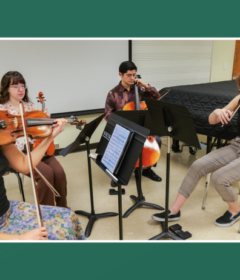Presenting at the Southeastern Biologists
Four Stetson University biology majors are attending and presenting their research at the 72nd Annual Meeting of the Association of Southeastern Biologists in Huntsville, Ala., this week (April 14-16). The students worked on specific projects with professors in preparation for the conference.
The Association of Southeastern Biologists promotes all areas of biology, from the cell to the ecosystem, and comprises about 1,400 members across 220 academic institutions and 60 non-academic institutions in all fields of biology. It holds a national meeting every April. The meetings bring together scientists from all over the Southeast to share information and results of their research.
The four Stetson students participating are:
Cailin Kellmann, a senior biology major from Deltona, Fla., has been working with Dr. Alicia Schultheis,associate professor of biology, to understand how a diet of filamentous algae affects growth and development of the springsnail Floridobia floridana. Species of filamentous algae are becoming more abundant in many spring runs throughout central Florida, and Kellmann and Schultheis found that snails fed a diet rich in the filamentous algae Lyngbya show reduced growth. Many spring snail species are considered Species of Great Conservation Need (Florida Wildlife Commission), and understanding how changes in diet affect snail growth provides important information about how these species are affected by changes in their environment.
“Cailin’s long hours in the lab and attention to detail really paid off,” Schultheis said. “We expect to submit a manuscript to a scientific journal this summer, and her work earned the Biology Department’s ‘Outstanding Research Award’ this year. Cailin’s work will really help to improve our understanding of springsnail ecology.” Kellmann’s work with Schultheis was funded by the Stetson 2010 SURE grant program and the Dean’s Fund.
Courtney Gardner, senior biology major from Land O’Lakes, Fla., has been working with Schultheis, on “The suitability of microsatellite loci for paternity analysis in Passiflora incarnate.” This project identified three DNA markers that will be used to determine whether plants that exhibit gender plasticity and switch from hermaphroditic to male flowers sire more seeds than plants that remain hermaphroditic.
“Courtney’s work will help to further our understanding of how gender plasticity contributes to evolutionary fitness in plants,” Schultheis said. Gardner’s work with Schultheis was funded by the Stetson 2010 SURE grant program.
Timothy Roberts, a junior in biology from Orlando, Fla., has been working with Schultheis on “Genetic differentiation in populations of the springsnail Floridobia floridana.” Roberts used mitochondrial DNA data to determine levels of genetic structure among several central Florida populations of springsnail.
“Tim has taken full advantage of the comprehensive education offered at Stetson and is one of the most well-rounded students with whom I have had the pleasure of working,” said Schultheis. “Tim has a thirst for knowledge that will serve him well as a scientist.” Roberts has received a Stetson SURE grant to continue his work on Floridobia this summer.
Caitlin Peterson, senior biology major from Ocala, Fla., spent two weeks in Alaska last summer with Dr. Cindy Bennington, associate professor of biology, as part of a research project funded by the National Science Foundation. Peterson traveled more than 1,000 miles in interior Alaska to study the stomata on the leaves of a widespread arctic sedge, Eriophorum vaginatum, in populations that span a latitudinal gradient from Fairbanks to Prudhoe Bay. Because stomata are central to plant gas exchange and physiology, her research findings of distinct genetic differences in stomatal characteristics among populations has implications for predictions about the response of this species to rapid arctic climate change.
“Caity is an exceptional student who has sought out, and taken advantage of, every opportunity Stetson has to offer,” Bennington said. “Not only has Caity developed into an excellent scientist during her college career, but her travels to Guatemala, Kenya, and Alaska have provided life experiences that deepened her convictions to live a life that makes a difference.”


